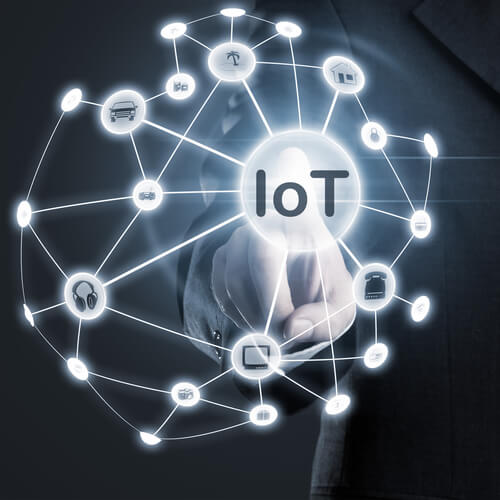Blockchain in IoT: Smart Gets Secure
Introduction
Blockchain and IoT are revolutionary technologies that are bringing a world of changes around us, one step at a time. By definition, Blockchain refers to an encrypted, distributed, decentralized computer filing system designed to facilitate the creation of tamper-proof, real-time records. IoT is a term used to describe the interconnection of computing devices embedded in everyday objects via the Internet that allows them to send and receive data.
Merging the two technologies together, it makes way for creation of a model for a reliable, secure, and permanent method of recording data processed by smart devices.
The combination of Blockchain and IoT can empower businesses to both access and share IoT data within their private network safely, without needing any central control and management system whatsoever.
Identity ValidationDevice identity is recorded and validated on an immutable ledger |
|
|
|
|
Device ReputationReputation is calculated and recorded based on monitored transactions |
|
InteroperabilityEnables transactions between validated devices, regardless of manufacturer |
Build TrustBuild trust between parties and devices, stronger working relationship with your partner |
|
Data protectionReduce risk of collusion and tampering. |
|
Reduce CostReduce cost by removing overhead associated with middlemen and intermediaries |
|
|
|
Accelerate TransactionReduce settlement time from days to near instantaneous |

IoT Challenges
The sheer number of installed IoT devices in homes and at workplaces and the enormous volume of data they are expected to generate is impossible to handle via conventional approaches. Handling such vast amounts of data inevitably raises security concerns with the incidents of cybercrimes increasing significantly over the last decade. With millions of devices connected to the Internet, each becomes vulnerable to possible security breaches (hacking, phishing, etc. if proper security measures aren’t put in place. Although the existing security technologies are playing a major role in mitigating IoT security risks, they won’t suffice in the long run.
Blockchain in IoT: Applications
- Supply Chain and Logistics: A supply chain network involves numerous stakeholders, and this is primarily the reason why delivery delay becomes one of the biggest challenges in the supply chain and logistics industry. This is where Blockchain and IoT enter.
While IoT-enabled devices allow companies to track shipment at every stage, Blockchain provides transparency to the entire transaction. IoT sensors (for example, motion sensors, GPS, temperature sensors, etc.) can offer details about the shipment status.
This information is then stored in the Blockchain network for transparency – once the data is recorded on the Blockchain network, all the supply chain stakeholders listed in the Smart Contracts can access the information in real-time. Thus enhancing reliability and achieving traceability.
- Automotive Industry: Digitization has swept across all sectors of the industry, and the automotive industry is no exception. Today, automotive companies are leveraging IoT-enabled sensors to develop fully automated vehicles. The automotive industry is further inclined to connecting IoT enabled vehicles with Blockchain tech to allow multiple users to exchange crucial information easily and quickly.
Also, the industry is readily exploiting Blockchain IoT use cases that can transform autonomous cars, smart parking, and automated traffic control for the better.
It is possible to create a smart parking solution by combining Blockchain and IoT. It has collaborated with PNI, a parking sensor company for real-time vehicle detection and finding possible parking spots in the parking area. The integration also automates payments using crypto-wallets.
- Smart Homes Industry: In the traditional centralized approach, exchanging information generated by IoT devices lacks the security standards and ownership of data. However, thanks to Blockchain IoT allows homeowners to manage the home security system remotely from the smartphone. Blockchain could elevate Smart Homes security by eliminating the limitations of centralized infrastructure.
For instance, an Australian telecommunication and media company, provides smart home solutions. The company has implemented Blockchain and biometric security to ensure no one can manipulate the data captured from smart devices. Naturally, when the data is saved on the Blockchain, only the authorized person/persons can access it.
- Pharmacy Industry: One of the biggest challenges of the pharmaceutical sector is the increasing incidence of counterfeit medicines. Blockchain IoT comes as a relief. The pharmacy industry is now capable of countering this issue. Blockchain IoT allows all the stakeholders involved in the drug manufacturing process to be responsible and update the Blockchain network with relevant information in real-time.
The transparent nature of Blockchain will further allow all the stakeholders to access and monitor all the stages of drug manufacturing and supply from their connected devices.
- Sharing Economy: The sharing economy has become a widely adopted concept around the world. Blockchain could help create decentralized, shared economy applications to earn considerable revenue by sharing the goods seamlessly.
There are proposals to develop Universal Sharing Network(USN). Using the USN, any object can be rented, sold, or shared securely without requiring intermediaries. It could be possible for third-parties like manufacturers to onboard any object to the Universal Sharing Network (USN) without seeking permission. Smart contracts ensure data privacy and transparency by controlling access to information.
